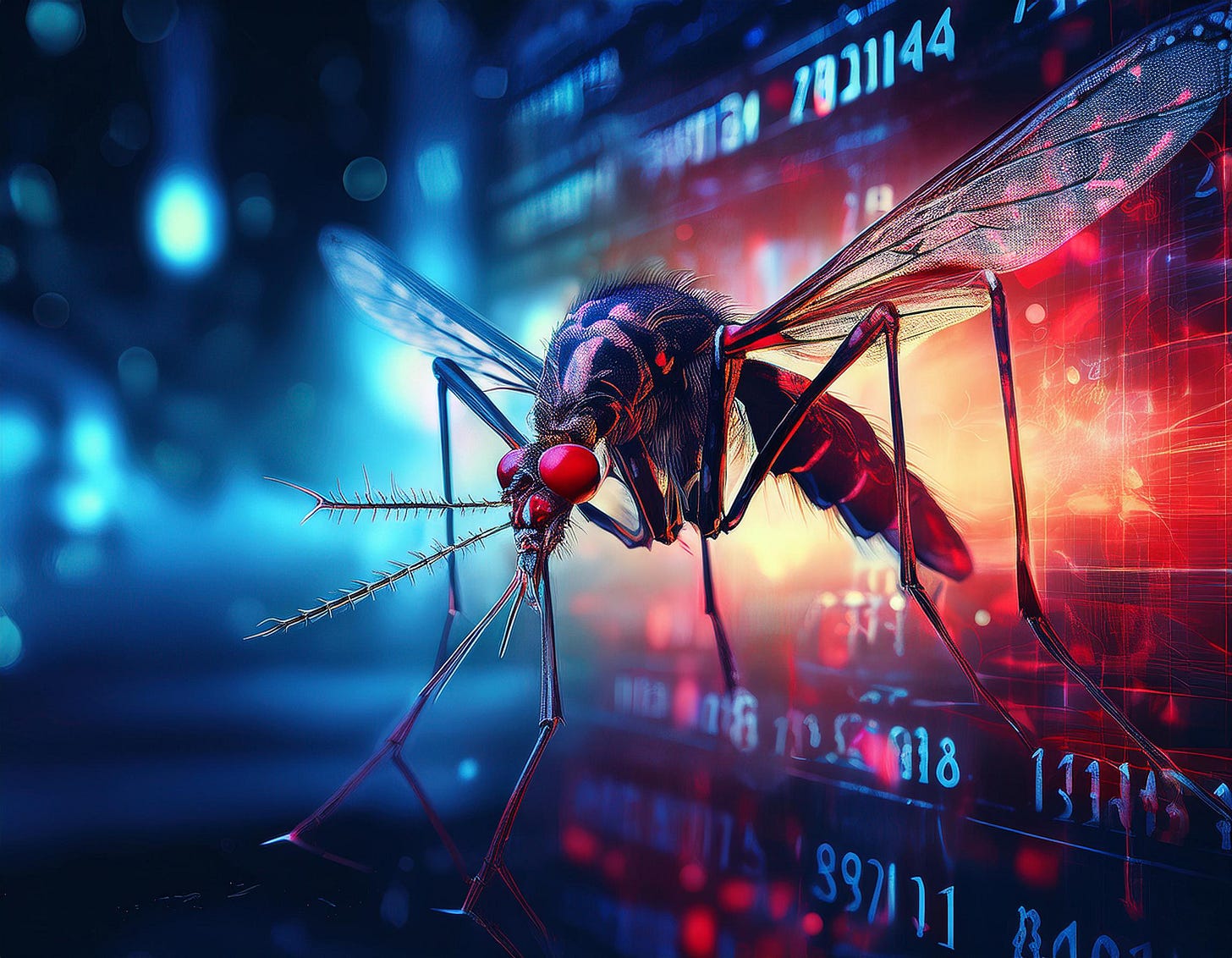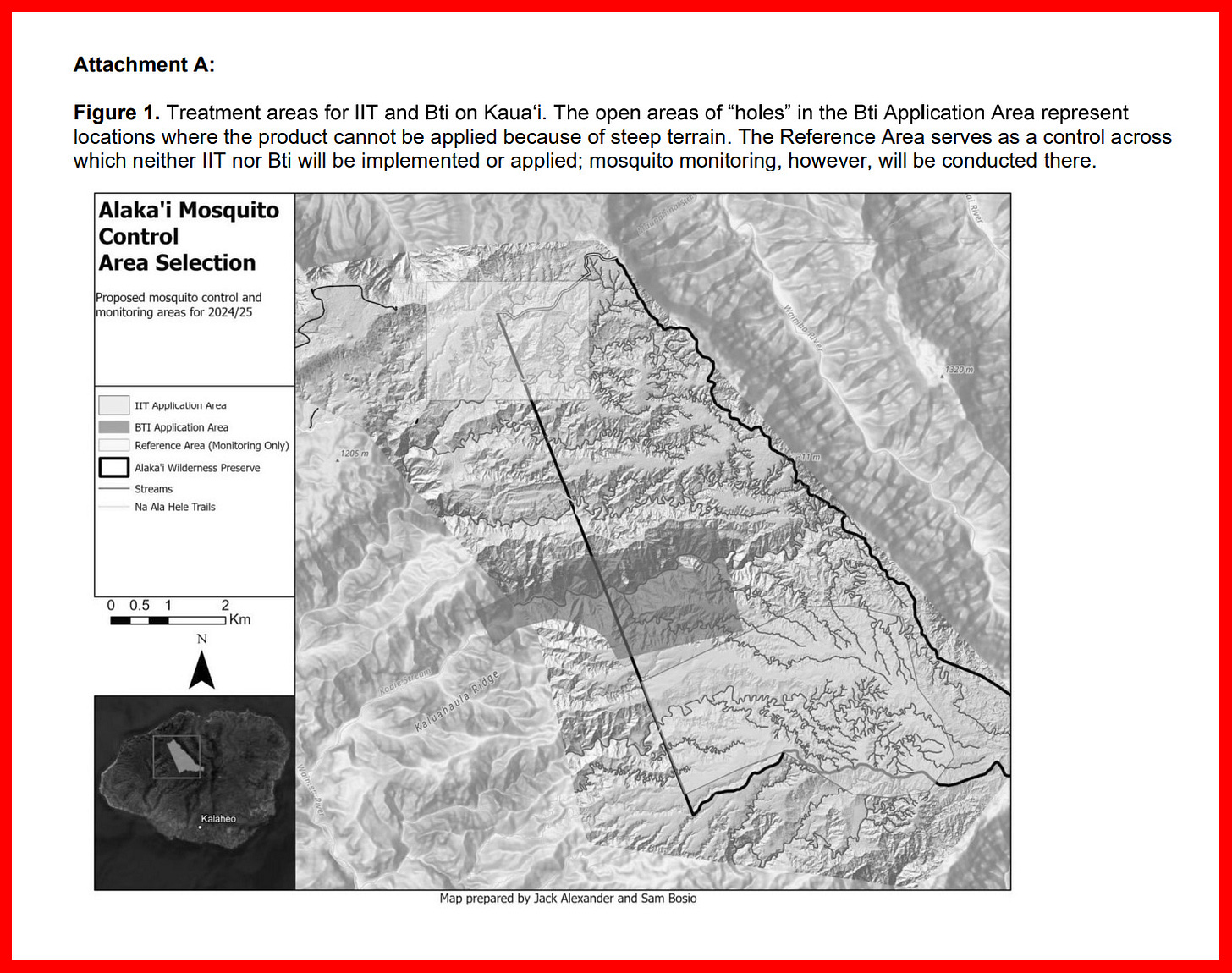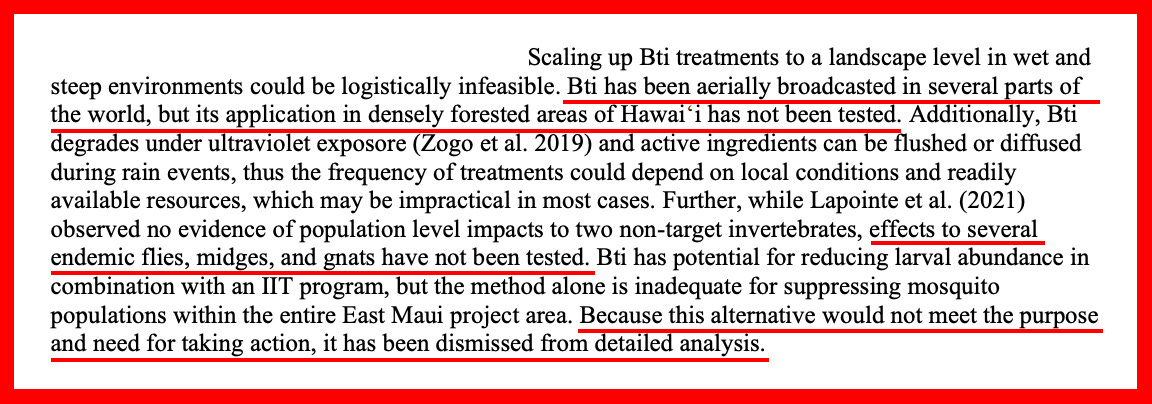Question the Data: Bti Bacterial Larvicide Now Being Sprayed in Addition to the Release of Wolbachia-Infected Mosquitoes
How do agency partners plan to prevent falsified data on the effects of their bacteria-infected mosquitoes if a supplemental population control method is in use?
Data falsification involves the manipulation or alteration of data, including rigging the methods of a study so that a particular result is more likely. Our islands are currently being used as testing grounds for the biotech industry, with the state’s multi-agency partnership releasing millions of experimental bacteria-infected mosquitoes in East Maui since the project began last year. There’s big money behind this agenda, and the results of these experiments could affect the revenue of the labs pushing these mosquitoes and impact the funding of the agencies involved for years to come. We have yet to see any data on the effects of these mosquito releases, and with the recent announcement of aerial spraying of a supplemental mosquito control product on Maui and Kaua‘i, all data presented from here on out is called into question.
Agency partners in the bacteria-infected mosquito release projects on Maui and Kaua‘i have already lied about multiple aspects of their plan, including the introduction of foreign organisms into the islands and the release of female mosquitoes that bite, breed, and spread disease. They’ve been blatantly deviating from the approved release methods on Maui for several months, increasing the risks of wildland fires and accident incidents. With all that in mind, we have to consider the potential for data falsification through the use of an additional product that may make it impossible to accurately determine the effectiveness of their lab-altered mosquitoes as a suppression technique.
At last month’s Board of Land and Natural Resources meeting, DLNR Division of Forestry and Wildlife’s (DOFAW’s) Lindsey Nietmann gave a very short informational briefing on the use of the larvicide Bti (Bacillus thuringiensis israelensis) that has now become part of the plan for suppressing mosquito populations on Maui and Kaua‘i. Documentation submitted by DOFAW for the agenda item describes their intent to work with agency partners to utilize Bti along with the Wolbachia-bacteria-infected IIT (Incompatible Insect Technique) mosquitoes “as part of a broader integrated pest management approach to suppressing southern house mosquitoes” in forest bird habitats.
In other words, their bacteria-infected mosquitoes don’t appear to be working as planned, so they’ve now decided they need to spray another bacterium into the environment to fix the problem.
According to the EPA:
“Bti is a biological or a naturally occurring bacterium found in soils. (Bti is short for Bacillus thuringiensis subspecies israelensis.) It contains spores that produce toxins that specifically target and only affect the larvae of the mosquito, blackfly and fungus gnat.”
“Bti can be sprayed over waterbodies such as ponds, lakes, rivers and streams. Bti is used to kill developing mosquito larvae by being applied to standing water where those larvae are found.”
DOFAW’s submittal asserts that Bti is “another safe and effective tool.” They also state that the “World Health Organization has approved the use of Bti in drinking water.” It’s unclear why this is specifically mentioned, though it may be an acknowledgement that the bacteria could end up in our water supply. Bti may also affect food webs and other ecosystem properties and functioning, including biodiversity.
No map of the planned Bti spray sites for Maui has been disclosed, but DOFAW does provide a map of the current Kaua‘i location (approximately 4,200 acres). Based on the ever-changing facts of this entire plan, there’s no way of knowing if Bti spray locations within both islands’ project areas may be subject to change at any time.
A recent Hawai‘i Public Radio article explains that Bti larvicide is being used on Kaua‘i because agency partners have had to delay the project releases of bacteria-infected mosquitoes until January 2025. No explanation is given for the need to spray Bti on Maui, where they’ve already been releasing millions of bacteria-infected mosquitoes since November 2023. According to the article, the state is using helicopters to apply the Bti.
“The state Department of Land and Natural Resources has already applied it over parts of Kauaʻi and has plans to do so on Maui later this month. Crews are spraying the larvicide over rainforests in a ‘fine mist,’ according to officials.”
In the environmental assessments (EAs) for both Maui and Kaua‘i, the official approved documents for the Wolbachia lab-altered mosquito releases, Bti larvicide is actually considered and dismissed as an alternative mosquito control method.
By altering their plan in this way, these agencies are further proving that these mosquito releases are an experiment. Bti is no longer an alternative that was considered and dismissed but is now being integrated into the projects in yet another deviation from the approved EAs. If the intention all along was to use Bti for suppression in combination with the lab-altered mosquitoes, then this clearly would need to have been stated in the environmental assessments. Where is the “detailed analysis” of its use? Has there been any study on the effects of Bti on endemic flies, midges, gnats, or the ecosystems as a whole?
These agencies also need to answer some serious questions about how they intend to prevent data for these projects from being falsified. Let’s start with these:
If the release of bacteria-infected mosquitoes causes an increase in mosquito populations, will the use of Bti larvicide cause that data to be falsified?
If the use of Bti larvicide causes any reduction in mosquito populations, will that data be used to falsify data on the effects of releasing the lab-altered mosquitoes as a method of mosquito suppression?
With Bti sprayed into the air and bacteria-infected mosquitoes released into the air, and with both products being carried on the wind to intended and unintended areas, how will data be collected separately on each product to assure that data for the experimental mosquitoes isn’t falsified?
So far, the agencies involved in these projects have not spoken to these concerns. Data falsification is research misconduct in violation of scientific integrity and ethics. While we certainly hope that every effort is being made to prevent this from happening, the actions we’ve seen up to this point are not very reassuring.
Whistleblowers are encouraged to come forward. Please contact Hawai‘i Unites if you’re working with this multi-agency partnership and would like to document any concerns about the mosquito suppression plans for the islands, including information regarding research integrity.
Hawai‘i Unites has taken state agencies to court to stop the release of bacteria-infected mosquitoes on Maui. Our case is active and moving through the appeals process. This case can set a precedent for strengthening Hawai‘i’s environmental laws for all islands, and the outcome can affect the course of this biotech experimentation agenda worldwide. Your tax-deductible donations support the work that we’re doing to protect the ‘āina and help us continue to move our court case forward.
Mahalo,
Tina Lia
Founder
Hawai‘i Unites
HawaiiUnites.org
Hawai‘i Unites is a 501(c)(3) nonprofit organization dedicated to the conservation and protection of our environment and natural resources. Your tax-deductible donations help us to fulfill our mission of honoring and protecting our sacred connection to the natural world.
Report a Mosquito Bite
The State of Hawai‘i and its multi-agency partnership Birds, Not Mosquitoes have been releasing bacteria-infected mosquitoes in East Maui and conducting pilot study releases on Kaua‘i since 2023. As part of our ongoing research and documentation, Hawai‘i Unites has been compiling reports from throughout the islands about unusual mosquito bite reactions. If you’ve been bitten by a mosquito and would like to report the incident, please complete our Mosquito Bite Incident Report.






https://substack.com/profile/112140167-travis-christian-lau/note/c-64304517
We need eyes on these terrorists. DLNR meeting live stream now. Please watch
https://www.youtube.com/live/1SeLFe9oid0?feature=shared